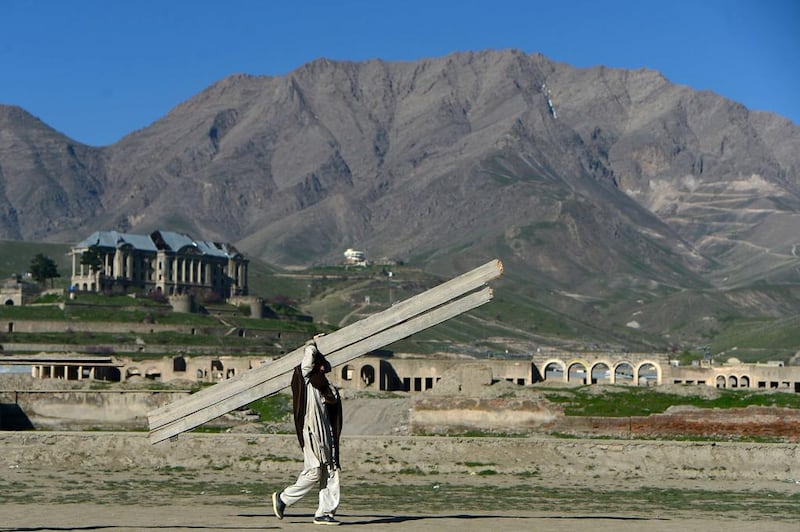Mariam Wardak, who returned to work in Afghanistan after years away, says members of the Afghan diaspora should help rebuild the country, despite the dangers. Follow Ms Wardak on Twitter: @MaroWardak
Like so many others, my family fled fighting in Afghanistan in the 1980s. My mother and I emigrated to the United States.
My father, Serajuddin Wardak, stayed and fought with the mujaheddin.
I finished my studies in the US, interning in 2004 at the US embassy in Afghanistan for nine months. At this time my father was working as a social worker in a small village in a rural area of Wardak province. He’d established an orphanage, community centre and a school, where boys and girls would go on different days.
This all was very difficult to achieve.
He was also a hero to all the women. Wardak is so traditional that a woman could not show her face to her brothers-in-law or father-in-law.
In Islam, women are supposed to cover, but not necessarily their face. He brought my mother, who did not cover her face, to the village as an example.
Slowly, women started to follow this way. This is the type of transition he led.
I’d returned to Afghanistan with one suitcase, planning to stay a short time. When I was packing to leave my father asked me to stay. He emotionally blackmailed me! I laugh at this now, but that’s what happened. I began working at the ministry of rural rehabilitation and development as a consultant.
In 2011, my father passed away in a car accident on the way to the Salang Pass.
I felt like his responsibilities were passed on to me. I felt that if I left I would be doing injustice to all the good that my father had done in the past two decades. So I stayed.
It’s like quicksand, being in Afghanistan. It’s hard to get out once you put your foot in.
It’s the country that motivates me. Now, I’m at the foreign ministry. In comparison to other government institutions, there are a lot of women at the foreign ministry. We have many strong women. We have female ambassadors and diplomats. The foreign minister, strongly believes in empowering women in the ministry as men have dominated the workforce.
All the international backers of Afghanistan are probably going to leave. How is the country going to move forward, since we are already doubting the institutions of the country itself?
The only people that can move the country forward are the Afghans themselves. I think the Afghan diaspora is needed here. Some have returned to the private sector. But others are so turned off by what they see in both the private and public sector, they just stay away.
Security is another issue. Some Afghans back in the US think I am insane for coming back.
Others think it’s noble.
There are many challenges. Being an Afghan returnee, I am held to a double standard. My etiquette, my style, all that has to be on par with the Afghans.
I also can’t go out in the middle of the street and walk around and enjoy a soda pop. I have to have a driver everywhere. The only real social life you have is with your family and a few friends and that’s why family and friends are so important here.
Staying out late is not safe. I used to go out to eat. Now, I stay at home or go to a friend’s house. My focus is more towards work and, on my time off, supporting the community through civil societies such as Afghanistan Forward and Society of Afghan Women in Engineering and Construction.
I do still visit Wardak, though the security situation there is horrible. The Taliban has a very strong presence there, unfortunately. Why is that? The international military forces in the area had problems with communication. They were quite aggressive. They were not proper.
The whole local system is run by the elders. The best approach would have been to learn how to connect with the elders. But there was a lot of fighting both ways and the Taliban began threatening everyone. There is also a lack of jobs and little means to provide an alternative for young people. You see the Taliban driving around there. They are often 15-year-olds, 16-year-olds on motorcycles.
If members of the Afghan diaspora return they should come back with ideas and bring some sort of material to help rebuild Afghanistan. We had 13 years of money coming from the international community, but infrastructure is still weak. We don’t have big business. We need to focus on agriculture and the private sector. We need to make major economic links to other developed countries.
This would stop people joining the Taliban.
Afghans also don’t have to return here. They can help from abroad as long as they don’t give up on their nation. I only emphasise this because we must remember our responsibility to Afghanistan. We must assist in restoring institutions so they do not collapse. We can help prevent this nation from repeating past mistakes and help understand the present. We can be an important instrument for a better Afghanistan.
foreign.desk@thenational.ae





